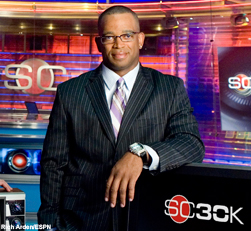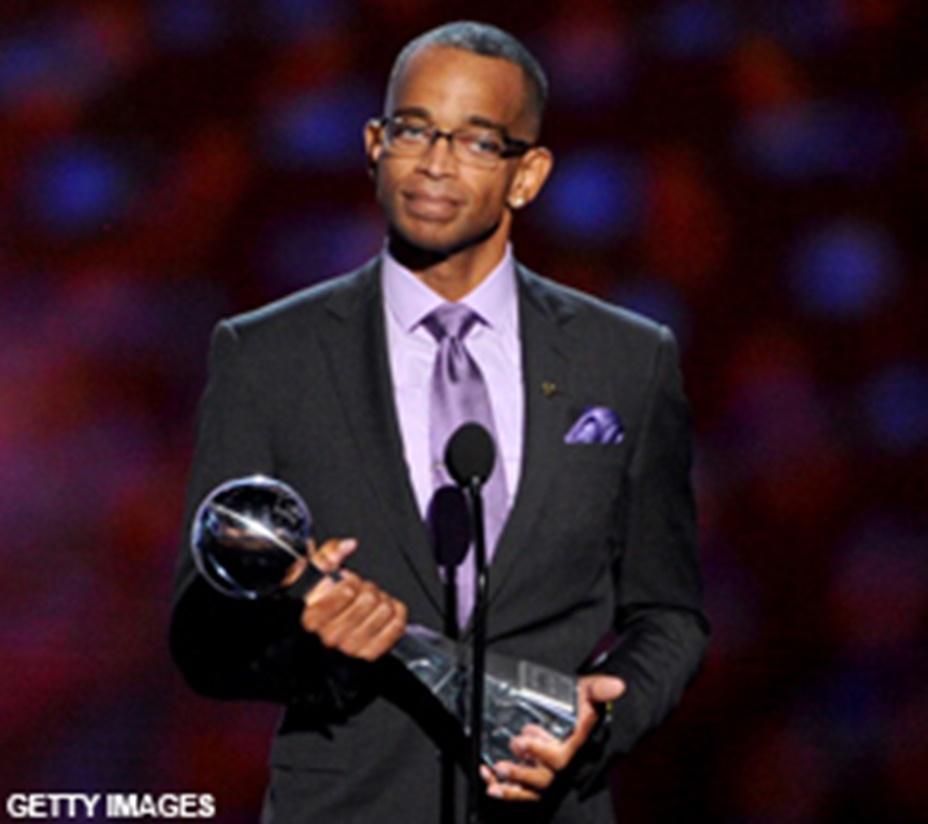Longtime ESPN anchor Stuart Scott died yesterday at the age of 49 after battling cancer since '07. ESPN President John Skipper in a statement said, "ESPN and everyone in the sports world have lost a true friend and a uniquely inspirational figure in Stuart Scott. ... His energetic and unwavering devotion to his family and to his work while fighting the battle of his life left us in awe, and he leaves a void that can never be replaced" (Mult., 1/4). In N.Y., Richard Sandomir writes Scott was "known for infusing his reports with a blend of pop culture references, slang and exuberant phrases that made him something of a pop culture figure in his own right." His signature phrase "Booyah!" spread "well beyond sports and into mainstream culture." Scott was the "most prominent black sportscaster at ESPN," which hired him in '93 "for the beginning of its first spinoff network, ESPN2." However, he soon began hosting "SportsCenter" and became "defined as much for his energy, wit and stylish wardrobe as for his arsenal of catchphrases." He first learned he had cancer in '07 "while on assignment in Pittsburgh for 'Monday Night Football,'" having had an emergency appendectomy. The cancer "recurred several times, requiring him to miss stretches of time in the studio and assignments" (N.Y. TIMES, 1/5). Also in N.Y., Bob Raissman notes Scott's decision "to continue to work" while going through cancer treatment made his "tenuous plight even more public." When he "disappeared from the scene (he was absent from his on-site anchor role for 'MNF' this season), speculation mounted concerning his condition." Raissman: "The absence of a lesser known member of the interchangeable cast of ESPN anchors would hardly be noticed" (N.Y. DAILY NEWS, 1/5).
ONE OF ESPN'S SIGNATURE ANCHORS: USA TODAY's Chris Strauss notes Scott quickly became "one of the network's main 'SportsCenter' anchors thanks to his rapid-fire delivery and unique phrasing to describe highlights." By '08, Scott was "ubiquitous among the network's programming." In addition to anchoring "SportsCenter," he hosted "Monday Night Countdown," was the "lead host for NBA on ESPN and ABC and interviewed Barack Obama during the 2008 presidential campaign" (USA TODAY, 1/5). THE ATLANTIC's Matt Schiavenza wrote Scott over the years "emerged as one of the network's most familiar faces, graduating from SportsCenter duties into a wider range of roles." He covered events like the the World Series, NBA Finals, the Super Bowl, and "interviewed Tiger Woods and Michael Jordan." He also "played a videotaped basketball game with President Obama." Schiavenza: "Once a novelty at ESPN, Scott eventually became an institution" (THEATLANTIC.com, 1/4). In Hartford, Paul Doyle notes Scott "became a signature face on ESPN's signature show and is the name viewers of a certain generation associate" with "SportsCenter." His catchphrases "were mimicked by kids during backyard games all over the country and his cultural references seemed to open the door for an entirely new audience" (HARTFORD COURANT, 1/5). In Boston, Chad Finn notes Scott "made his name in the '90s" on "SportsCenter" by "coining such lasting catchphrases as 'cool as the other side of the pillow' and 'booyah!'" (BOSTON GLOBE, 1/5). ROLLING STONE's Daniel Kreps noted Scott "formed a much-watch duo" with both Steve Levy and Rich Eisen, who gave a moving tribute to Scott during yesterday's edition of "NFL GameDay Morning" on NFL Network. Scott "displayed a masterful talent for weaving hip-hop lyrics and references into sports highlights on an almost-nightly basis." He appeared in music videos for LL Cool J and Luke and "was frequently referenced in rap lyrics" (ROLLINGSTONE.com, 1/4).
STAYING TRUE TO HIMSELF: In Orlando, David Whitley writes under the header, "Stuart Scott Succeeded By Doing It His Way." Most ESPN anchors "had their shtick, but the great ones broke molds," and "nobody was more unique than Scott." Whitley: "His hip-hop stylings appealed to an audience that had never been spoken to. Athletes got it. So did the young urban demographic the media and advertisers covet." The way Scott "voiced things did not appeal to everybody," and he was often "blasted as a contrived, catchphrase-stealing jock sniffer." Fox Sports' Charles Davis, a close friend of Scott, said, "He took the barrage but never wavered. A lot of us would have wavered" (ORLANDO SENTINEL, 1/5). MLB Network's Brian Kenny, who worked with Scott at ESPN, wrote Scott's "freewheeling style seems like the norm now, but at the time he came up against enormous resistance." Kenny: "He never let the tinge of hate or veiled racism get to him" (SPORTSONEARTH.com, 1/4). NBC's Lester Holt noted Scott was known for his "great energy and sharp wit," and he "helped reinvent the language of sports" ("Nightly News," NBC, 1/4). ESPN's Jason Whitlock wrote Scott "didn't want to sound like everyone else on television." Whitlock: "He didn't want to appeal to the same audience. He wanted to be unique, a voice for a generation marching to its own beat. Mission accomplished" (ESPN.com, 1/4). MLB.com's Richard Justice: "He was the guy city kids knew. He spoke for them and to them. He represented diversity and so much more" (MLB.com, 1/4). Dan Patrick dedicated the first eight minutes of his radio show today to Scott and said, "There were times when I anchored with him, I didn't know what he was saying. But I knew there were people that did understand what he was saying. To have the guts and the courage, that's what's remarkable." Patrick added, "In this cookie cutter world that we call sportscasting … Stuart went in and wasn't afraid to have a voice” (“The Dan Patrick Show,” 1/5).
 |
Scott first learned he had cancer in '07 while on
assignment in Pittsburgh for "MNF" |
THE VOICE OF THE PEOPLE: ESPN's Cris Carter said Scott "talked on ‘SportsCenter’ like me and my friends talked." Carter: "He was a role model for me and hundreds of other African-American journalists/athletes now who wanted to be legitimate and want people to take what we say seriously, just like him." ESPN's Keyshawn Johnson: "Looking at him and knowing that he was able to bring the hip-hop culture, that urban feel to television sports broadcasting ... gave me the hope that I didn't have to be some corporate guy" ("Postseason NFL Countdown," ESPN, 1/4). Fox’ Michael Strahan said Scott “for my generation transformed TV." He "made it cool to say some things that you would say with your friends and didn’t necessarily see someone say it on TV” (“Fox Sports Live,” FS1, 1/4). ESPN's Mike Greenberg said Scott "changed the vernacular of sports." Greenberg: "He changed the way sports are discussed in this country" ("Mike & Mike," ESPN Radio, 1/5). ESPN's J.A. Adande wrote while Scott "was known for bringing hip-hop vernacular to ESPN, he took pride in packing more information than anyone else into each highlight" (ESPN.com, 1/4). MSNBC's Joe Scarborough said Scott “broke down the barrier between athletes in a way that many did not, and there are so many catchphrases that we now take for granted that he brought into the lexicon.” MSNBC’s Willie Geist said "SportsCenter" anchors Dan Patrick and Keith Olbermann "deserve their place in the pantheon," as they "changed the whole thing." Geist: "But after that, Stuart Scott changed it again because he spoke the language that we spoke" ("Morning Joe," MSNBC, 1/5).
A LASTING LEGACY: THE MMQB's Peter King writes Scott likely "influenced as many young broadcasters today as anyone in the field." King: "I bet he opened doors to scores of aspiring African-American broadcasters who thought, watching Scott, that they could do what he did, That is one great legacy to leave" (MMQB.SI.com, 1/5). SI.com's Richard Deitsch wrote the "biggest legacy" Scott leaves at ESPN could be the fact his presence "moved the company forward in terms of diversity on the air." ESPN's Jemele Hill said there is "no doubt Stuart influenced a generation of journalists, especially African Americans, who were inspired by Stuart's passion and loved that he infused his own style, despite being in an industry that was unaccustomed to seeing a brash black man smoothly intertwine slang and pop culture while doing highlights" (SI.com, 1/4). Redskins S Ryan Clark, who has contributed to ESPN, posed an entry on THE MMQB under the header, "Stuart Scott Was My Idol." Clark: "There had been black anchors and contributors on TV ... but they never referenced anything that was a part of my life. This guy wasn't just the best; he was speaking to us, and he didn't seem to care about the consequences of being himself" (MMQB.SI.com, 1/5). Boston Herald Radio's Brad Johnson writes, "I always worry about teetering on the edge of sounding too hood or too street when describing a spectacular play, but Stuart Scott made it possible, even necessary, to translate the playground vernacular to America's airwaves" (BOSTON HERALD, 1/5).
A TAR HEEL BORN, A TAR HEEL BRED: In Raleigh, Joe Giglio notes Scott, an alum of the Univ. of North Carolina, "had a love for all things UNC, especially the Tar Heels basketball team." He "regularly came back to Chapel Hill to host 'Late Night with Roy Williams.'" The school "had a moment of silence for Scott" before yesterday's women's basketball game against N.C. State (Raleigh NEWS & OBSERVER, 1/5). Williams in a statement said, "The fun side of just listening to him on the TV. 'Vince Carter -- Tar Heel. Antawn Jamison -- Tar Heel.' I loved that part of it. He was probably the first broadcaster in any form that could show that and it didn't bother people." Scott also gave the commencement speech in '01 at UNC's spring graduation (THE DAILY).
TWITTER REAX: Twitter was overrun with thoughts and condolences for Scott yesterday once news of his death was announced. SI's Tim Layden wrote, "Stuart Scott created a voice and a style. So few have done that. A rare and remarkable thing." CNBC's Brian Sullivan wrote, "Stuart Scott changed broadcasting. He spoke to us, not at us." CNN's Brian Stelter: "Stuart Scott was the sports broadcaster an entire generation of aspiring broadcasters wanted to be." Boston.com's Gary Dzen: "For a generation that grew up alongside ESPN, Stuart Scott WAS sports television." MSNBC's Jamil Smith: "I knew of many black journalists growing up. Stuart Scott was one of the few I could actually see every night." Yahoo Sports' Kevin Kaduk: "A lot of broadcasters have tried to be Stuart Scott because he was so good at it. But, of course, there was only one." Toronto-based Sportsnet 590's Greg Brady: "Many sports anchors bring little in terms of innovation & overdo it on the smarm & phony charm -- Scott can't be accused of any of that." CSN New England's Trenni Kusnierek: "Stu Scott was so much more than catchphrases. Only the kind, special ones connect w the audience." ESPN Radio West Palm Beach's Ken LaVicka: "Many, including me, did fair share of poking fun at Stu Scott. But no denying how large a figure he was to young sports fan me." NFL Network's Andrew Siciliano: "When I was a kid broadcaster, we tried to imitate Marv Albert. Easier said than done. Today, every kid wants to be Stu Scott. Good luck."





